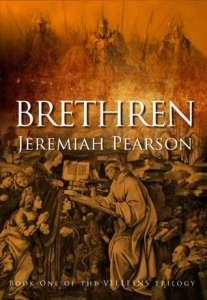
Brethren is the first book in Jeremiah Pearson’s Villeins Trilogy, a Christian/historical fiction series about a sect of Anabaptists in 16th Century Europe. Based in the Holy Roman Empire just prior to the Protestant/Catholic wars of religion and amidst the Ottoman/Hapsburg conflicts, this is a fascinating look at the lives of pacifist protestants during the bloodiest religious wars in history.
First, it must be said, the historical accuracy of this novel is astounding. Many historical fiction writers take great liberties with facts in the name of fiction. To his great credit, Pearson does so sparingly enough as to be unnoticeable to anyone who has not studied the Enlightenment Era German principalities extensively. The settings, characters, and plot all have a distinct panache appropriate to the locations and era.
Even the reasoning the characters employ have genuine historical flavor. There is no contemporary commentary that slips into their logic, and no alien sense of modern hindsight intervenes in their perceptions. It all feels like a tale pulled straight from the time period, and that is the highest praise one can give historical fiction.
Pearson has delivered a suspenseful plot with a collection of complex protagonists. In particular, he perfectly captures the strengths, flaws, struggles, and inner demons of all his characters. They are rich and compelling in their depth. Kristina is wonderfully absorbing in her struggle to do God’s will despite her anger. Konrad feels compelling and real in his conditioned aristocratic superiority. Lud evokes relational emotion in his loneliness and uncertainty. All are exceptionally well-written characters.
The writing is largely excellent as well. Besides a few overused words ignored during editing, the prose is very high quality. It is clear, rich, and, as stated, authentic. Pearson writes with unquestionable historic flair, and his attention to description allows readers to stay immersed in the story.
One issue is that Pearson would do well to work on his pacing skills. This is a 500-page novel that should be closer to 300 or 400 pages in length. Certain issues and character struggles are hashed and rehashed multiple times, especially in the early portions of the book. Brethren is an excellent story overall, but readers might not continue long enough to gain interest if they have to hear about Kristina’s buried anger or Lud’s doubts several times in the first hundred pages. Entire chapters could be removed and readers would still be aware of the characters’ struggles.
In a similar vein, Pearson could stand to indulge in the maxim “show, don’t tell,” especially in Witter’s chapters, which are generally backstory info-dumps, and not continuations of the plot. Too much of Witter’s past escapes are outlined like a biography, when his survivalist attitude could be better woven into the narrative.
None of this is to say, however, that Brethren is boring or the characters are flat. This is a compelling tale, one that could only be improved by further attention to pacing, so it’s a shame that a book of this caliber is diminished by these issues. Overall, Brethren is a truly gripping, authentic story; this is historical fiction done right.
Links
Author Site
Amazon
Goodreads
STAR RATING
Design
Editing
Content
Get an Editorial Review | Get Amazon Sales & Reviews | Get Edited | Get Beta Readers | Enter the SPR Book Awards | Other Marketing Services























Leave A Comment